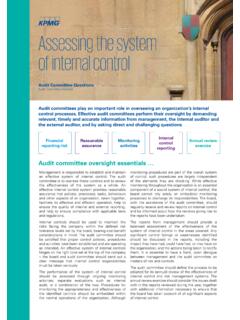Transcription of LOGISTICS AND WAREHOUSING MANAGEMENT …
1 About IIMM Indian Institute of Materials MANAGEMENT (IIMM) , with its headquarters at Navi Mumbai, is a Professional Body of Materials MANAGEMENT classified under Engineering & Technology Group under Apprenticeship Act, 1961 and is recognised by ISTE, its wide network of 52 branches and 19 chapters having around 9500 members drawn from public and private sectors, IIMM is dedicated to the promotion of the profession of Materials MANAGEMENT through its multifarious activities including Educational Programs approved by AICTE (Post Graduate Diploma in Materials MANAGEMENT and Post Graduate Diploma in Supply Chain MANAGEMENT & LOGISTICS ), Seminars, National Conferences, Regional Conferences, Workshops, In-house training programs, Consultancy & Research have an effective global interaction, the Institute is a charter member of International Federation of Purchasing and Supply MANAGEMENT (IFPSM), Atlanta (USA) which has its roots in over 44 member countries.
2 In furtherance of its objectives, IIMM brings out a monthly journal, Materials MANAGEMENT Review comprising latest Articles and Research Papers in the field of Materials, LOGISTICS , Purchase, Inventory, Supply Chain MANAGEMENT and latest Technological Innovations like Artificial Intelligence, Block Chain, Cloud Computing and Internet of Things. The Institute has its Centre for Research in Materials MANAGEMENT (CRIMM) at Kolkata, which is engaged in promotion of research activities in collaboration with industries for furthering the advancement of the profession of Materials and Supply Chain Institute is dedicated for the Societal & Environmental considerations through Sustainable Procurement, Green Purchasing and Life Cycle Consideration, which are part of our course curriculum.
3 The aim & objective of the Institution is to update & upgrade the skills & knowledge of professionals so as to ensure inclusive and sustainable development. Indian Institute of Materials ManagementPlot No. 102 & 104, Sector-15,Institutional Area, CBD Belapur, Navi Mumbai 400614Ph.: 0222 757 1022/0222 756 5592, E-mail: Website: LOGISTICS AND WAREHOUSING MANAGEMENTLOGISTICS AND WAREHOUSING MANAGEMENTIIMML ogistics and WAREHOUSING MANAGEMENT IIMM Copyright 2020 PublisherISBN: 978-93-89795-50-9 This book may not be duplicated in any way without the express written consent of the publisher, except in the form of brief excerpts or quotations for the purposes of review. The information contained herein is for the personal use of the reader and may not be incorporated in any commercial programs, other books, databases, or any kind of software without written consent of the publisher.
4 Making copies of this book or any portion, for any purpose other than your own is a violation of copyright laws. The author and publisher have used their best efforts in preparing this book and believe that the content is reliable and correct to the best of their knowledge. The publisher makes no representation or warranties with respect to the accuracy or completeness of the contents of this of ContentsChapter 1: An Introduction to LOGISTICS MANAGEMENT ..1 Chapter 2: LOGISTICS and Supply Chain MANAGEMENT ..19 Chapter 3: Transportation: Backbone of LOGISTICS ..33 Chapter 4: Containerisation ..49 Chapter 5: Container Freight Stations ..63 Chapter 6: Dry Ports in LOGISTICS MANAGEMENT ..79 Chapter 7: Introduction to WAREHOUSING ..95 Chapter 8: Functions of WAREHOUSING .
5 109 Chapter 9: Warehouse Location and Design ..123 Chapter 10: Warehouse Activities and Equipment ..143 Chapter 11: Health and Safety Issues in WAREHOUSING ..165 Chapter 12: WAREHOUSING Strategy .. Concept of LOGISTICS MANAGEMENT Definition of Scope of LOGISTICS Objectives of LOGISTICS MANAGEMENT Importance of LOGISTICS ManagementSelf Assessment Types of LogisticsSelf Assessment Components of LOGISTICS ManagementSelf Assessment LOGISTICS Activities in the Manufacturing Organisation Self Assessment Role of LOGISTICS in an EconomySelf Assessment Key Case Exercise Answers for Self Assessment Questions Suggested Books and e-ReferencesTable of ContentsCHAPTERAn Introduction to LOGISTICS Management1 IIMML ogistics and WAREHOUSING Management2 NotesAfter studying this chapter, you will be able to.
6 Describe the concept of LOGISTICS MANAGEMENT Explain the scope, objectives and importance of LOGISTICS MANAGEMENT Describe the types and components of LOGISTICS MANAGEMENT Describe the LOGISTICS activities in the manufacturing organisation Discuss the role of LOGISTICS in an economyLEARNING today s highly competitive global business scenario, organisations are compelled to find innovative ways to deliver value to their customers. The changing global market dynamics make an organisation compete with competitors in terms of products, cost, quality and services. This, in turn, has paved the way for a need to develop LOGISTICS systems that are more advanced as compared to traditional methods. Over the last two decades, LOGISTICS has shifted its focus from a mere operational level to the corporate level.
7 A growing need for effective LOGISTICS MANAGEMENT that encompasses the whole organisation assists in cost reduction and enhancing service MANAGEMENT maximises profit by integrating an organisation with flow of materials, information and funds. The key to a successful LOGISTICS MANAGEMENT requires an efficient collaboration of activities, cooperation, coordination and information sharing throughout the organisation s supply chain. It plays a crucial role in solving perplexed LOGISTICS problems and manage the entire supply chain as a single entity. It is cardinal to an organisation as it is concerned with both materials and information flow. On the one hand, while the materials flow from the supplier to the consumer, on the other hand, information flows from the consumer to the supplier in the form of feedback.
8 It is not just limited to inventory and resource maximisation, but even customer feedback of the product also comes under the scope of LOGISTICS . It establishes a link between the manufacturing and various operations of the organisation. Without this crucial link, it would be uphill for organisations to make their products reach the target customers. The Council of Supply Chain MANAGEMENT Professionals (CSCMP) defines LOGISTICS MANAGEMENT as that part of supply chain MANAGEMENT that plans, implements, and controls the efficient, effective forward and reverse flow and storage of goods, services and related information between the point of origin and the point of consumption to meet customers requirements. The CSCMP explains LOGISTICS MANAGEMENT as the MANAGEMENT activities that include inbound and outbound transportation MANAGEMENT , fleet MANAGEMENT , WAREHOUSING , materials handling, order fulfilment, inventory MANAGEMENT , demand and supply planning and MANAGEMENT of third-party LOGISTICS service providers.
9 LOGISTICS also encompasses various aspects of customer service, procurement, planning and scheduling production and packaging. LOGISTICS MANAGEMENT comprises all IIMMAn Introduction to LOGISTICS Management3 Noteslevels of planning and implementation, whether strategic or operational. LOGISTICS further collaborates functions of marketing, sales, manufacturing and finance, and information this chapter, you will study the concept of LOGISTICS MANAGEMENT along with its scope, objectives and importance. The chapter will also brief you about the types and components of LOGISTICS MANAGEMENT . Later on, the chapter discusses the LOGISTICS activities in the manufacturing organisation and the role of LOGISTICS in a country s OF LOGISTICS MANAGEMENT LOGISTICS MANAGEMENT is an essential component of supply chain MANAGEMENT that aims at catering to customer demands.
10 LOGISTICS MANAGEMENT involves planning, controlling and implementing of the movement and storage of goods and services from the point of origin to the ultimate customer. It enables organisations to cut down on expenses and bolster customer satisfaction. The genesis of the term LOGISTICS was military-based that encompasses how military personnel procured, stored and moved army equipment and supplies. The term is now pervasively used across the business industry, especially by organisations in the manufacturing process of LOGISTICS MANAGEMENT is initiated from garnering raw materials to the final stage of delivering finished products for customers to avail. LOGISTICS MANAGEMENT entails formulating strategy, planning and implementing it to address customers demand while also considering prevailing market condition.





